Leadership Effectiveness: Theories, Approaches, and Practices Overview
VerifiedAdded on 2022/12/08
|8
|2582
|500
Essay
AI Summary
This essay provides a comprehensive overview of leadership in the business environment, emphasizing its crucial role in guiding employees and achieving organizational goals. It delves into various leadership theories, including transformational and transactional leadership, highlighting their effectiveness in motivating employees and driving performance. The essay also explores trait theory, behavioral theory, and the Great Man theory, discussing their implications for leadership effectiveness. Furthermore, it outlines key leadership principles, such as self-awareness, team building, and goal setting, which are essential for successful leadership. By analyzing these theories and principles, the essay underscores the importance of effective leadership for organizational growth and success in a competitive market. The paper examines different leadership styles and theories, including transformational, transactional, trait, and behavioral approaches, and discusses their practical applications and impact on employee motivation and performance, concluding that effective leadership is critical for achieving organizational goals. The essay concludes by emphasizing the significance of effective leadership for organizational growth and success, offering insights into various leadership styles and their practical applications.

Leadership
Paraphrase This Document
Need a fresh take? Get an instant paraphrase of this document with our AI Paraphraser
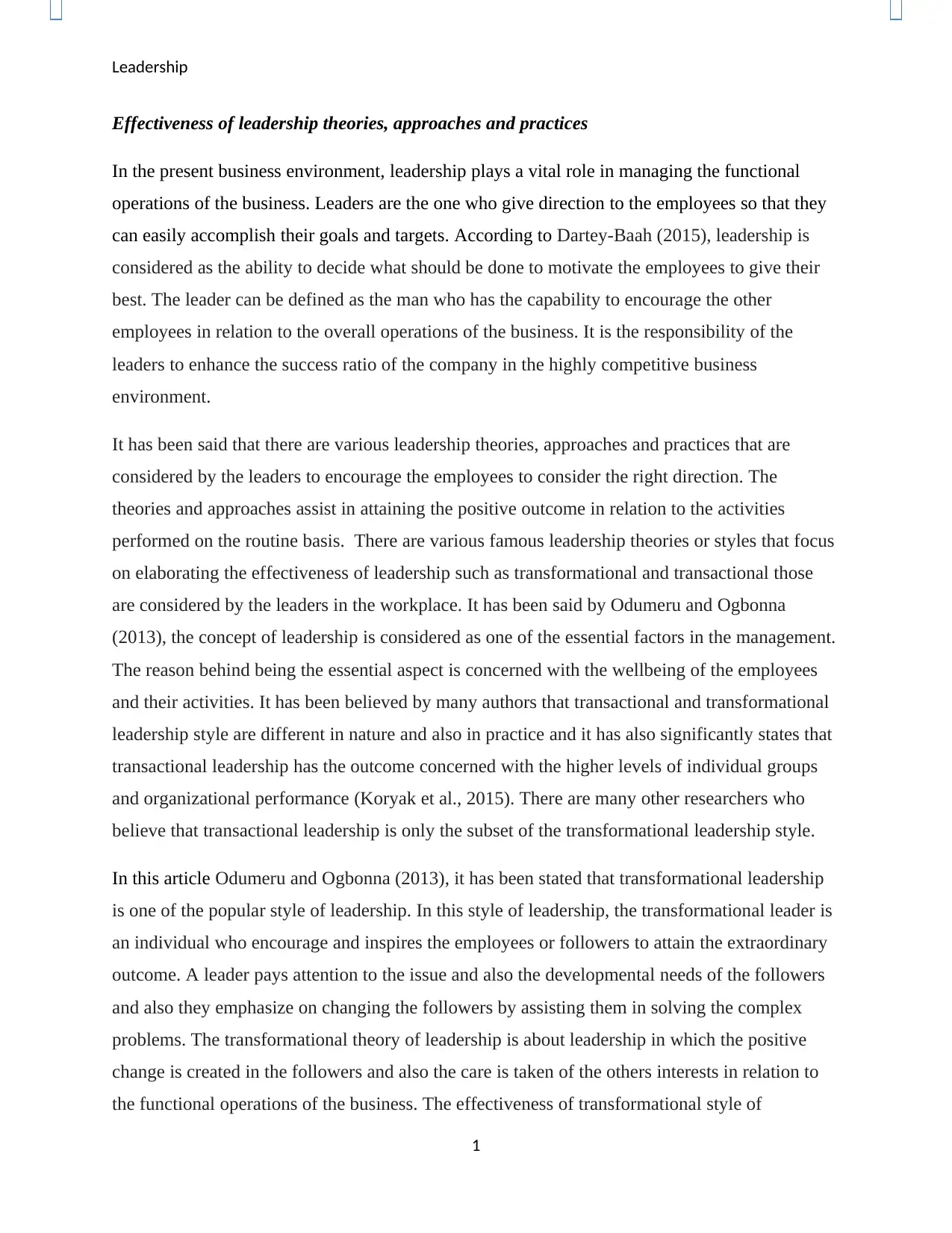
Leadership
Effectiveness of leadership theories, approaches and practices
In the present business environment, leadership plays a vital role in managing the functional
operations of the business. Leaders are the one who give direction to the employees so that they
can easily accomplish their goals and targets. According to Dartey-Baah (2015), leadership is
considered as the ability to decide what should be done to motivate the employees to give their
best. The leader can be defined as the man who has the capability to encourage the other
employees in relation to the overall operations of the business. It is the responsibility of the
leaders to enhance the success ratio of the company in the highly competitive business
environment.
It has been said that there are various leadership theories, approaches and practices that are
considered by the leaders to encourage the employees to consider the right direction. The
theories and approaches assist in attaining the positive outcome in relation to the activities
performed on the routine basis. There are various famous leadership theories or styles that focus
on elaborating the effectiveness of leadership such as transformational and transactional those
are considered by the leaders in the workplace. It has been said by Odumeru and Ogbonna
(2013), the concept of leadership is considered as one of the essential factors in the management.
The reason behind being the essential aspect is concerned with the wellbeing of the employees
and their activities. It has been believed by many authors that transactional and transformational
leadership style are different in nature and also in practice and it has also significantly states that
transactional leadership has the outcome concerned with the higher levels of individual groups
and organizational performance (Koryak et al., 2015). There are many other researchers who
believe that transactional leadership is only the subset of the transformational leadership style.
In this article Odumeru and Ogbonna (2013), it has been stated that transformational leadership
is one of the popular style of leadership. In this style of leadership, the transformational leader is
an individual who encourage and inspires the employees or followers to attain the extraordinary
outcome. A leader pays attention to the issue and also the developmental needs of the followers
and also they emphasize on changing the followers by assisting them in solving the complex
problems. The transformational theory of leadership is about leadership in which the positive
change is created in the followers and also the care is taken of the others interests in relation to
the functional operations of the business. The effectiveness of transformational style of
1
Effectiveness of leadership theories, approaches and practices
In the present business environment, leadership plays a vital role in managing the functional
operations of the business. Leaders are the one who give direction to the employees so that they
can easily accomplish their goals and targets. According to Dartey-Baah (2015), leadership is
considered as the ability to decide what should be done to motivate the employees to give their
best. The leader can be defined as the man who has the capability to encourage the other
employees in relation to the overall operations of the business. It is the responsibility of the
leaders to enhance the success ratio of the company in the highly competitive business
environment.
It has been said that there are various leadership theories, approaches and practices that are
considered by the leaders to encourage the employees to consider the right direction. The
theories and approaches assist in attaining the positive outcome in relation to the activities
performed on the routine basis. There are various famous leadership theories or styles that focus
on elaborating the effectiveness of leadership such as transformational and transactional those
are considered by the leaders in the workplace. It has been said by Odumeru and Ogbonna
(2013), the concept of leadership is considered as one of the essential factors in the management.
The reason behind being the essential aspect is concerned with the wellbeing of the employees
and their activities. It has been believed by many authors that transactional and transformational
leadership style are different in nature and also in practice and it has also significantly states that
transactional leadership has the outcome concerned with the higher levels of individual groups
and organizational performance (Koryak et al., 2015). There are many other researchers who
believe that transactional leadership is only the subset of the transformational leadership style.
In this article Odumeru and Ogbonna (2013), it has been stated that transformational leadership
is one of the popular style of leadership. In this style of leadership, the transformational leader is
an individual who encourage and inspires the employees or followers to attain the extraordinary
outcome. A leader pays attention to the issue and also the developmental needs of the followers
and also they emphasize on changing the followers by assisting them in solving the complex
problems. The transformational theory of leadership is about leadership in which the positive
change is created in the followers and also the care is taken of the others interests in relation to
the functional operations of the business. The effectiveness of transformational style of
1
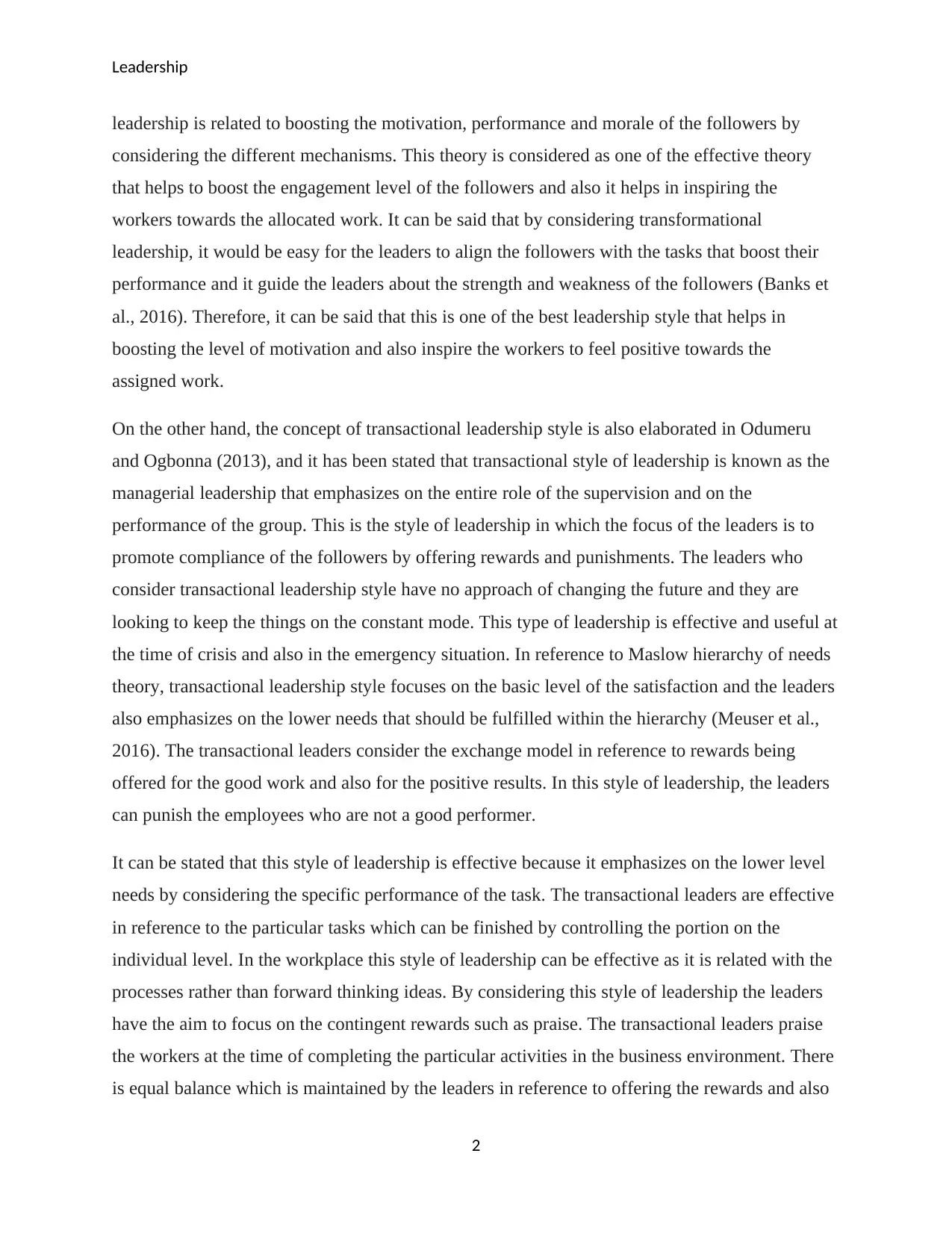
Leadership
leadership is related to boosting the motivation, performance and morale of the followers by
considering the different mechanisms. This theory is considered as one of the effective theory
that helps to boost the engagement level of the followers and also it helps in inspiring the
workers towards the allocated work. It can be said that by considering transformational
leadership, it would be easy for the leaders to align the followers with the tasks that boost their
performance and it guide the leaders about the strength and weakness of the followers (Banks et
al., 2016). Therefore, it can be said that this is one of the best leadership style that helps in
boosting the level of motivation and also inspire the workers to feel positive towards the
assigned work.
On the other hand, the concept of transactional leadership style is also elaborated in Odumeru
and Ogbonna (2013), and it has been stated that transactional style of leadership is known as the
managerial leadership that emphasizes on the entire role of the supervision and on the
performance of the group. This is the style of leadership in which the focus of the leaders is to
promote compliance of the followers by offering rewards and punishments. The leaders who
consider transactional leadership style have no approach of changing the future and they are
looking to keep the things on the constant mode. This type of leadership is effective and useful at
the time of crisis and also in the emergency situation. In reference to Maslow hierarchy of needs
theory, transactional leadership style focuses on the basic level of the satisfaction and the leaders
also emphasizes on the lower needs that should be fulfilled within the hierarchy (Meuser et al.,
2016). The transactional leaders consider the exchange model in reference to rewards being
offered for the good work and also for the positive results. In this style of leadership, the leaders
can punish the employees who are not a good performer.
It can be stated that this style of leadership is effective because it emphasizes on the lower level
needs by considering the specific performance of the task. The transactional leaders are effective
in reference to the particular tasks which can be finished by controlling the portion on the
individual level. In the workplace this style of leadership can be effective as it is related with the
processes rather than forward thinking ideas. By considering this style of leadership the leaders
have the aim to focus on the contingent rewards such as praise. The transactional leaders praise
the workers at the time of completing the particular activities in the business environment. There
is equal balance which is maintained by the leaders in reference to offering the rewards and also
2
leadership is related to boosting the motivation, performance and morale of the followers by
considering the different mechanisms. This theory is considered as one of the effective theory
that helps to boost the engagement level of the followers and also it helps in inspiring the
workers towards the allocated work. It can be said that by considering transformational
leadership, it would be easy for the leaders to align the followers with the tasks that boost their
performance and it guide the leaders about the strength and weakness of the followers (Banks et
al., 2016). Therefore, it can be said that this is one of the best leadership style that helps in
boosting the level of motivation and also inspire the workers to feel positive towards the
assigned work.
On the other hand, the concept of transactional leadership style is also elaborated in Odumeru
and Ogbonna (2013), and it has been stated that transactional style of leadership is known as the
managerial leadership that emphasizes on the entire role of the supervision and on the
performance of the group. This is the style of leadership in which the focus of the leaders is to
promote compliance of the followers by offering rewards and punishments. The leaders who
consider transactional leadership style have no approach of changing the future and they are
looking to keep the things on the constant mode. This type of leadership is effective and useful at
the time of crisis and also in the emergency situation. In reference to Maslow hierarchy of needs
theory, transactional leadership style focuses on the basic level of the satisfaction and the leaders
also emphasizes on the lower needs that should be fulfilled within the hierarchy (Meuser et al.,
2016). The transactional leaders consider the exchange model in reference to rewards being
offered for the good work and also for the positive results. In this style of leadership, the leaders
can punish the employees who are not a good performer.
It can be stated that this style of leadership is effective because it emphasizes on the lower level
needs by considering the specific performance of the task. The transactional leaders are effective
in reference to the particular tasks which can be finished by controlling the portion on the
individual level. In the workplace this style of leadership can be effective as it is related with the
processes rather than forward thinking ideas. By considering this style of leadership the leaders
have the aim to focus on the contingent rewards such as praise. The transactional leaders praise
the workers at the time of completing the particular activities in the business environment. There
is equal balance which is maintained by the leaders in reference to offering the rewards and also
2
⊘ This is a preview!⊘
Do you want full access?
Subscribe today to unlock all pages.

Trusted by 1+ million students worldwide
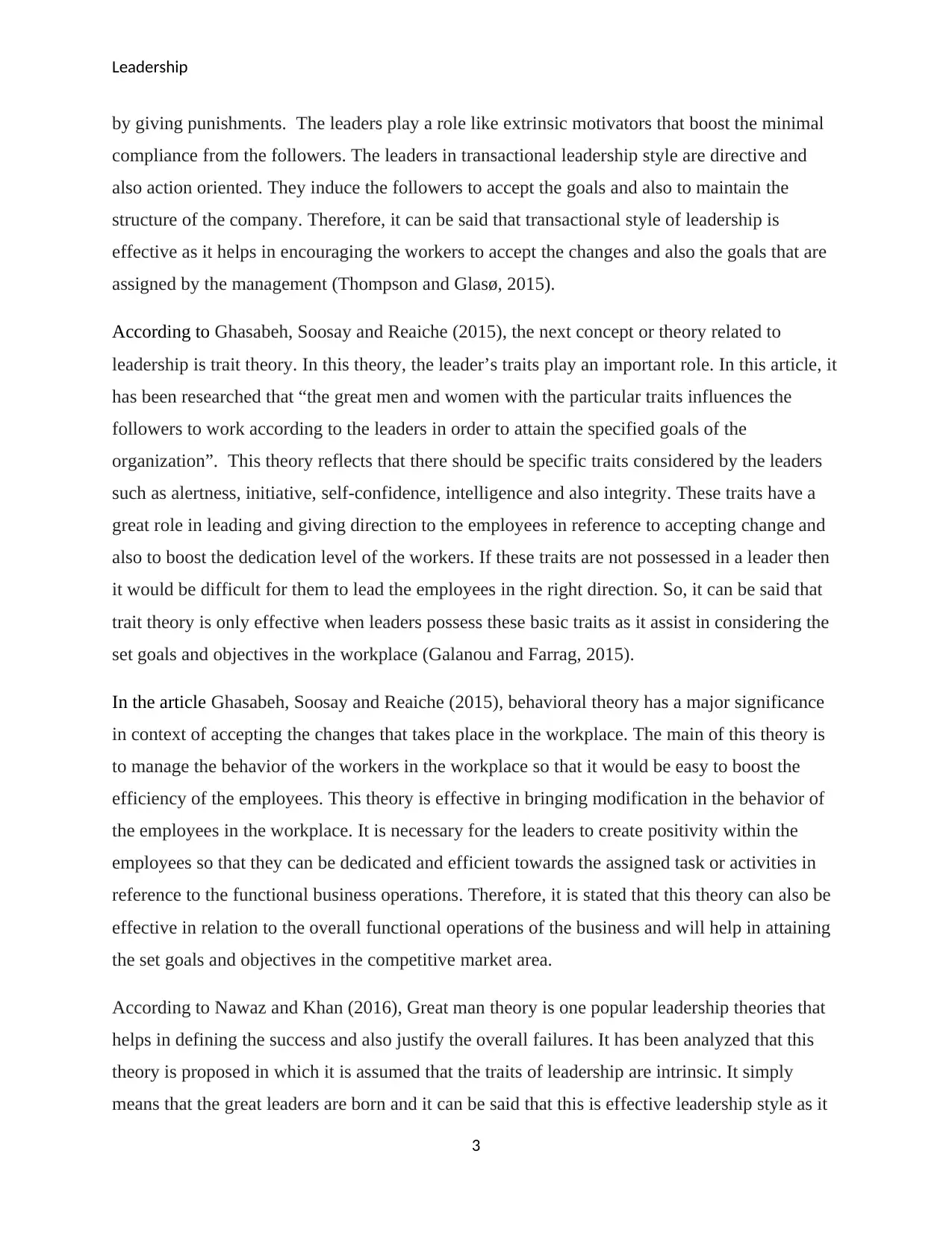
Leadership
by giving punishments. The leaders play a role like extrinsic motivators that boost the minimal
compliance from the followers. The leaders in transactional leadership style are directive and
also action oriented. They induce the followers to accept the goals and also to maintain the
structure of the company. Therefore, it can be said that transactional style of leadership is
effective as it helps in encouraging the workers to accept the changes and also the goals that are
assigned by the management (Thompson and Glasø, 2015).
According to Ghasabeh, Soosay and Reaiche (2015), the next concept or theory related to
leadership is trait theory. In this theory, the leader’s traits play an important role. In this article, it
has been researched that “the great men and women with the particular traits influences the
followers to work according to the leaders in order to attain the specified goals of the
organization”. This theory reflects that there should be specific traits considered by the leaders
such as alertness, initiative, self-confidence, intelligence and also integrity. These traits have a
great role in leading and giving direction to the employees in reference to accepting change and
also to boost the dedication level of the workers. If these traits are not possessed in a leader then
it would be difficult for them to lead the employees in the right direction. So, it can be said that
trait theory is only effective when leaders possess these basic traits as it assist in considering the
set goals and objectives in the workplace (Galanou and Farrag, 2015).
In the article Ghasabeh, Soosay and Reaiche (2015), behavioral theory has a major significance
in context of accepting the changes that takes place in the workplace. The main of this theory is
to manage the behavior of the workers in the workplace so that it would be easy to boost the
efficiency of the employees. This theory is effective in bringing modification in the behavior of
the employees in the workplace. It is necessary for the leaders to create positivity within the
employees so that they can be dedicated and efficient towards the assigned task or activities in
reference to the functional business operations. Therefore, it is stated that this theory can also be
effective in relation to the overall functional operations of the business and will help in attaining
the set goals and objectives in the competitive market area.
According to Nawaz and Khan (2016), Great man theory is one popular leadership theories that
helps in defining the success and also justify the overall failures. It has been analyzed that this
theory is proposed in which it is assumed that the traits of leadership are intrinsic. It simply
means that the great leaders are born and it can be said that this is effective leadership style as it
3
by giving punishments. The leaders play a role like extrinsic motivators that boost the minimal
compliance from the followers. The leaders in transactional leadership style are directive and
also action oriented. They induce the followers to accept the goals and also to maintain the
structure of the company. Therefore, it can be said that transactional style of leadership is
effective as it helps in encouraging the workers to accept the changes and also the goals that are
assigned by the management (Thompson and Glasø, 2015).
According to Ghasabeh, Soosay and Reaiche (2015), the next concept or theory related to
leadership is trait theory. In this theory, the leader’s traits play an important role. In this article, it
has been researched that “the great men and women with the particular traits influences the
followers to work according to the leaders in order to attain the specified goals of the
organization”. This theory reflects that there should be specific traits considered by the leaders
such as alertness, initiative, self-confidence, intelligence and also integrity. These traits have a
great role in leading and giving direction to the employees in reference to accepting change and
also to boost the dedication level of the workers. If these traits are not possessed in a leader then
it would be difficult for them to lead the employees in the right direction. So, it can be said that
trait theory is only effective when leaders possess these basic traits as it assist in considering the
set goals and objectives in the workplace (Galanou and Farrag, 2015).
In the article Ghasabeh, Soosay and Reaiche (2015), behavioral theory has a major significance
in context of accepting the changes that takes place in the workplace. The main of this theory is
to manage the behavior of the workers in the workplace so that it would be easy to boost the
efficiency of the employees. This theory is effective in bringing modification in the behavior of
the employees in the workplace. It is necessary for the leaders to create positivity within the
employees so that they can be dedicated and efficient towards the assigned task or activities in
reference to the functional business operations. Therefore, it is stated that this theory can also be
effective in relation to the overall functional operations of the business and will help in attaining
the set goals and objectives in the competitive market area.
According to Nawaz and Khan (2016), Great man theory is one popular leadership theories that
helps in defining the success and also justify the overall failures. It has been analyzed that this
theory is proposed in which it is assumed that the traits of leadership are intrinsic. It simply
means that the great leaders are born and it can be said that this is effective leadership style as it
3
Paraphrase This Document
Need a fresh take? Get an instant paraphrase of this document with our AI Paraphraser
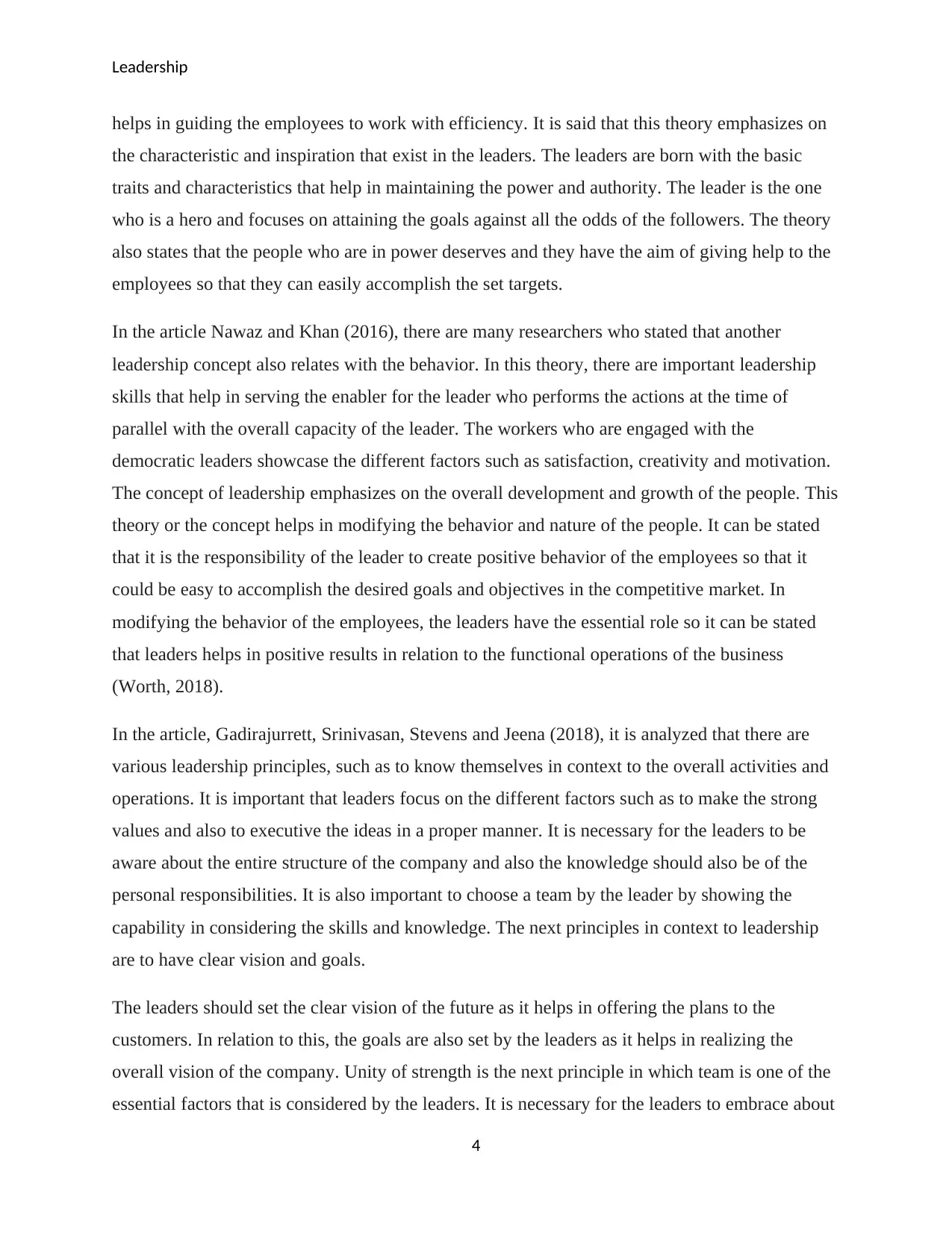
Leadership
helps in guiding the employees to work with efficiency. It is said that this theory emphasizes on
the characteristic and inspiration that exist in the leaders. The leaders are born with the basic
traits and characteristics that help in maintaining the power and authority. The leader is the one
who is a hero and focuses on attaining the goals against all the odds of the followers. The theory
also states that the people who are in power deserves and they have the aim of giving help to the
employees so that they can easily accomplish the set targets.
In the article Nawaz and Khan (2016), there are many researchers who stated that another
leadership concept also relates with the behavior. In this theory, there are important leadership
skills that help in serving the enabler for the leader who performs the actions at the time of
parallel with the overall capacity of the leader. The workers who are engaged with the
democratic leaders showcase the different factors such as satisfaction, creativity and motivation.
The concept of leadership emphasizes on the overall development and growth of the people. This
theory or the concept helps in modifying the behavior and nature of the people. It can be stated
that it is the responsibility of the leader to create positive behavior of the employees so that it
could be easy to accomplish the desired goals and objectives in the competitive market. In
modifying the behavior of the employees, the leaders have the essential role so it can be stated
that leaders helps in positive results in relation to the functional operations of the business
(Worth, 2018).
In the article, Gadirajurrett, Srinivasan, Stevens and Jeena (2018), it is analyzed that there are
various leadership principles, such as to know themselves in context to the overall activities and
operations. It is important that leaders focus on the different factors such as to make the strong
values and also to executive the ideas in a proper manner. It is necessary for the leaders to be
aware about the entire structure of the company and also the knowledge should also be of the
personal responsibilities. It is also important to choose a team by the leader by showing the
capability in considering the skills and knowledge. The next principles in context to leadership
are to have clear vision and goals.
The leaders should set the clear vision of the future as it helps in offering the plans to the
customers. In relation to this, the goals are also set by the leaders as it helps in realizing the
overall vision of the company. Unity of strength is the next principle in which team is one of the
essential factors that is considered by the leaders. It is necessary for the leaders to embrace about
4
helps in guiding the employees to work with efficiency. It is said that this theory emphasizes on
the characteristic and inspiration that exist in the leaders. The leaders are born with the basic
traits and characteristics that help in maintaining the power and authority. The leader is the one
who is a hero and focuses on attaining the goals against all the odds of the followers. The theory
also states that the people who are in power deserves and they have the aim of giving help to the
employees so that they can easily accomplish the set targets.
In the article Nawaz and Khan (2016), there are many researchers who stated that another
leadership concept also relates with the behavior. In this theory, there are important leadership
skills that help in serving the enabler for the leader who performs the actions at the time of
parallel with the overall capacity of the leader. The workers who are engaged with the
democratic leaders showcase the different factors such as satisfaction, creativity and motivation.
The concept of leadership emphasizes on the overall development and growth of the people. This
theory or the concept helps in modifying the behavior and nature of the people. It can be stated
that it is the responsibility of the leader to create positive behavior of the employees so that it
could be easy to accomplish the desired goals and objectives in the competitive market. In
modifying the behavior of the employees, the leaders have the essential role so it can be stated
that leaders helps in positive results in relation to the functional operations of the business
(Worth, 2018).
In the article, Gadirajurrett, Srinivasan, Stevens and Jeena (2018), it is analyzed that there are
various leadership principles, such as to know themselves in context to the overall activities and
operations. It is important that leaders focus on the different factors such as to make the strong
values and also to executive the ideas in a proper manner. It is necessary for the leaders to be
aware about the entire structure of the company and also the knowledge should also be of the
personal responsibilities. It is also important to choose a team by the leader by showing the
capability in considering the skills and knowledge. The next principles in context to leadership
are to have clear vision and goals.
The leaders should set the clear vision of the future as it helps in offering the plans to the
customers. In relation to this, the goals are also set by the leaders as it helps in realizing the
overall vision of the company. Unity of strength is the next principle in which team is one of the
essential factors that is considered by the leaders. It is necessary for the leaders to embrace about
4
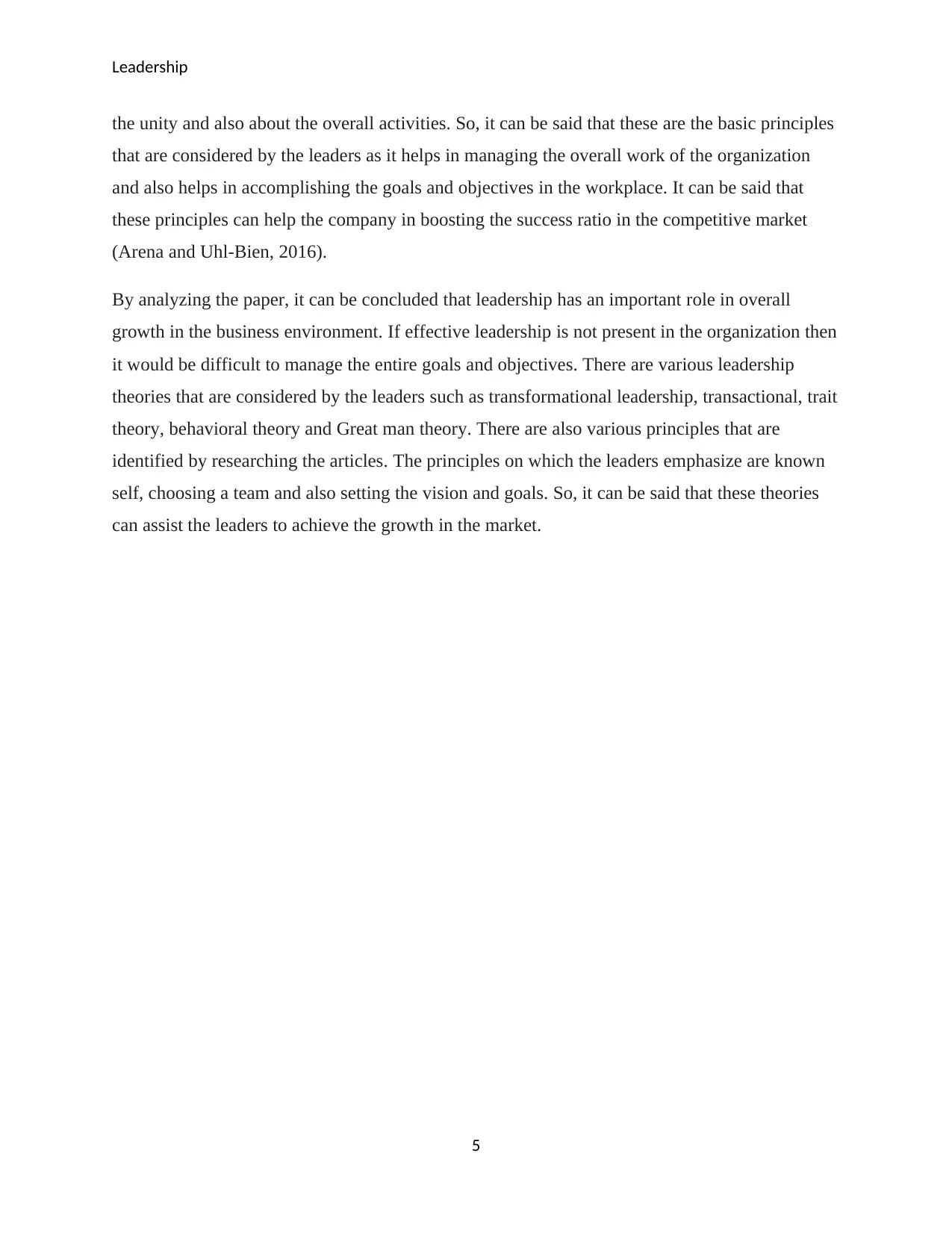
Leadership
the unity and also about the overall activities. So, it can be said that these are the basic principles
that are considered by the leaders as it helps in managing the overall work of the organization
and also helps in accomplishing the goals and objectives in the workplace. It can be said that
these principles can help the company in boosting the success ratio in the competitive market
(Arena and Uhl-Bien, 2016).
By analyzing the paper, it can be concluded that leadership has an important role in overall
growth in the business environment. If effective leadership is not present in the organization then
it would be difficult to manage the entire goals and objectives. There are various leadership
theories that are considered by the leaders such as transformational leadership, transactional, trait
theory, behavioral theory and Great man theory. There are also various principles that are
identified by researching the articles. The principles on which the leaders emphasize are known
self, choosing a team and also setting the vision and goals. So, it can be said that these theories
can assist the leaders to achieve the growth in the market.
5
the unity and also about the overall activities. So, it can be said that these are the basic principles
that are considered by the leaders as it helps in managing the overall work of the organization
and also helps in accomplishing the goals and objectives in the workplace. It can be said that
these principles can help the company in boosting the success ratio in the competitive market
(Arena and Uhl-Bien, 2016).
By analyzing the paper, it can be concluded that leadership has an important role in overall
growth in the business environment. If effective leadership is not present in the organization then
it would be difficult to manage the entire goals and objectives. There are various leadership
theories that are considered by the leaders such as transformational leadership, transactional, trait
theory, behavioral theory and Great man theory. There are also various principles that are
identified by researching the articles. The principles on which the leaders emphasize are known
self, choosing a team and also setting the vision and goals. So, it can be said that these theories
can assist the leaders to achieve the growth in the market.
5
⊘ This is a preview!⊘
Do you want full access?
Subscribe today to unlock all pages.

Trusted by 1+ million students worldwide
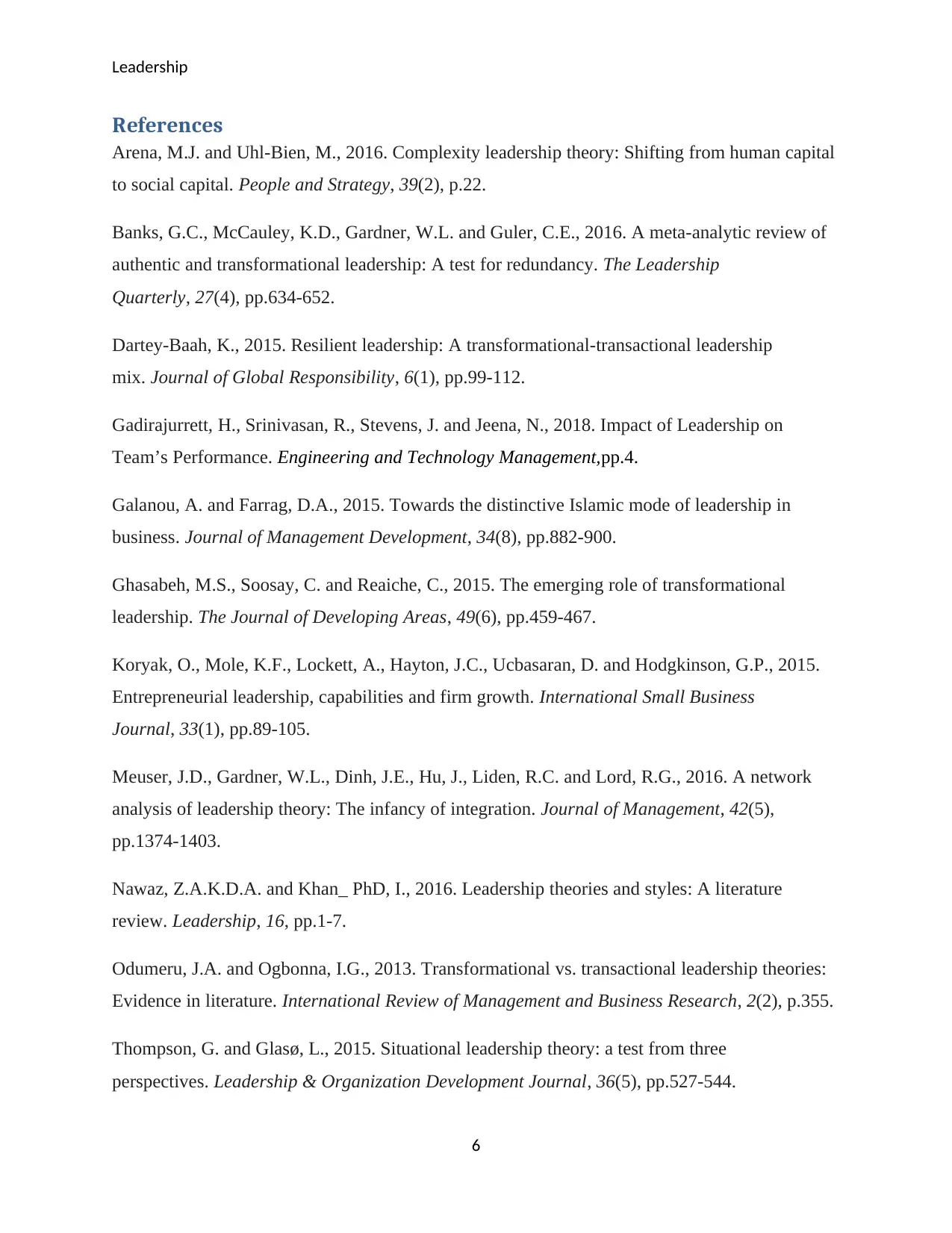
Leadership
References
Arena, M.J. and Uhl-Bien, M., 2016. Complexity leadership theory: Shifting from human capital
to social capital. People and Strategy, 39(2), p.22.
Banks, G.C., McCauley, K.D., Gardner, W.L. and Guler, C.E., 2016. A meta-analytic review of
authentic and transformational leadership: A test for redundancy. The Leadership
Quarterly, 27(4), pp.634-652.
Dartey-Baah, K., 2015. Resilient leadership: A transformational-transactional leadership
mix. Journal of Global Responsibility, 6(1), pp.99-112.
Gadirajurrett, H., Srinivasan, R., Stevens, J. and Jeena, N., 2018. Impact of Leadership on
Team’s Performance. Engineering and Technology Management,pp.4.
Galanou, A. and Farrag, D.A., 2015. Towards the distinctive Islamic mode of leadership in
business. Journal of Management Development, 34(8), pp.882-900.
Ghasabeh, M.S., Soosay, C. and Reaiche, C., 2015. The emerging role of transformational
leadership. The Journal of Developing Areas, 49(6), pp.459-467.
Koryak, O., Mole, K.F., Lockett, A., Hayton, J.C., Ucbasaran, D. and Hodgkinson, G.P., 2015.
Entrepreneurial leadership, capabilities and firm growth. International Small Business
Journal, 33(1), pp.89-105.
Meuser, J.D., Gardner, W.L., Dinh, J.E., Hu, J., Liden, R.C. and Lord, R.G., 2016. A network
analysis of leadership theory: The infancy of integration. Journal of Management, 42(5),
pp.1374-1403.
Nawaz, Z.A.K.D.A. and Khan_ PhD, I., 2016. Leadership theories and styles: A literature
review. Leadership, 16, pp.1-7.
Odumeru, J.A. and Ogbonna, I.G., 2013. Transformational vs. transactional leadership theories:
Evidence in literature. International Review of Management and Business Research, 2(2), p.355.
Thompson, G. and Glasø, L., 2015. Situational leadership theory: a test from three
perspectives. Leadership & Organization Development Journal, 36(5), pp.527-544.
6
References
Arena, M.J. and Uhl-Bien, M., 2016. Complexity leadership theory: Shifting from human capital
to social capital. People and Strategy, 39(2), p.22.
Banks, G.C., McCauley, K.D., Gardner, W.L. and Guler, C.E., 2016. A meta-analytic review of
authentic and transformational leadership: A test for redundancy. The Leadership
Quarterly, 27(4), pp.634-652.
Dartey-Baah, K., 2015. Resilient leadership: A transformational-transactional leadership
mix. Journal of Global Responsibility, 6(1), pp.99-112.
Gadirajurrett, H., Srinivasan, R., Stevens, J. and Jeena, N., 2018. Impact of Leadership on
Team’s Performance. Engineering and Technology Management,pp.4.
Galanou, A. and Farrag, D.A., 2015. Towards the distinctive Islamic mode of leadership in
business. Journal of Management Development, 34(8), pp.882-900.
Ghasabeh, M.S., Soosay, C. and Reaiche, C., 2015. The emerging role of transformational
leadership. The Journal of Developing Areas, 49(6), pp.459-467.
Koryak, O., Mole, K.F., Lockett, A., Hayton, J.C., Ucbasaran, D. and Hodgkinson, G.P., 2015.
Entrepreneurial leadership, capabilities and firm growth. International Small Business
Journal, 33(1), pp.89-105.
Meuser, J.D., Gardner, W.L., Dinh, J.E., Hu, J., Liden, R.C. and Lord, R.G., 2016. A network
analysis of leadership theory: The infancy of integration. Journal of Management, 42(5),
pp.1374-1403.
Nawaz, Z.A.K.D.A. and Khan_ PhD, I., 2016. Leadership theories and styles: A literature
review. Leadership, 16, pp.1-7.
Odumeru, J.A. and Ogbonna, I.G., 2013. Transformational vs. transactional leadership theories:
Evidence in literature. International Review of Management and Business Research, 2(2), p.355.
Thompson, G. and Glasø, L., 2015. Situational leadership theory: a test from three
perspectives. Leadership & Organization Development Journal, 36(5), pp.527-544.
6
Paraphrase This Document
Need a fresh take? Get an instant paraphrase of this document with our AI Paraphraser

Leadership
Worth, M.J., 2018. Nonprofit management: Principles and practice. Sage Publications.
7
Worth, M.J., 2018. Nonprofit management: Principles and practice. Sage Publications.
7
1 out of 8
Related Documents
Your All-in-One AI-Powered Toolkit for Academic Success.
+13062052269
info@desklib.com
Available 24*7 on WhatsApp / Email
![[object Object]](/_next/static/media/star-bottom.7253800d.svg)
Unlock your academic potential
Copyright © 2020–2026 A2Z Services. All Rights Reserved. Developed and managed by ZUCOL.





